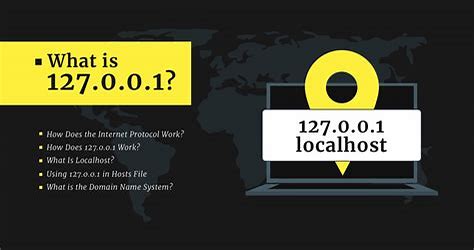Learn how to master 127.0.0.1:57573 for effective localhost testing in 2024. Discover the importance of this localhost address and port number in web development and network configurations.
127.0.0.1:57573 is a critical component for web developers and IT professionals. This article provides an in-depth look at how to use this localhost address and port number effectively for testing and development in 2024.
Introduction to 127.0.0.1:57573
127.0.0.1:57573 refers to a specific localhost address and port number used in web development. Localhost allows developers to run applications on their local machines for testing and debugging purposes before deploying them to a live server.
The Importance of Localhost and Ports
Localhost and ports play a vital role in web development by allowing developers to test applications locally. This approach prevents potential issues from affecting live servers and provides a controlled environment for debugging and testing.
Key Benefits of 127.0.0.1:57573
Secure Testing Environment
127.0.0.1 offers a secure environment where developers can test applications without exposing them to the internet, reducing security risks.
Elimination of Latency
Testing on localhost eliminates network latency, providing a faster and more responsive testing environment.
Port Versatility
Using port 57573 demonstrates how developers can assign different ports for various services, enabling multiple applications to run simultaneously on the same localhost.
Simplified Setup
Setting up a localhost environment is simple, with most development tools supporting configurations for localhost and specific ports.
Practical Use of 127.0.0.1:57573 in Development
Installing a Local Server
To use 127.0.0.1:57573, install a local server like Apache, Nginx, or Node.js. Configure the server to listen on port 57573 and serve your web application.
Application Configuration
Update your application’s configuration files to run on 127.0.0.1 and port 57573. This ensures the application is accessible locally for testing.
Comprehensive Testing
Run your application on localhost to conduct thorough testing. Identify and resolve any issues in this controlled environment before deploying to a live server.
Handling Multiple Projects
Assign unique port numbers to different projects to avoid conflicts. For example, one project can use 127.0.0.1:57573, while another uses 127.0.0.1:3000.
Best Practices for Using 127.0.0.1:57573
Regularly Update Server Software
Importance: Keeping your local server software up to date ensures that you have the latest features, performance improvements, and security patches. Outdated software can have vulnerabilities that might be exploited or bugs that could disrupt your development workflow.
How to Do It:
- Automate Updates: Configure your server software to check for updates automatically. Most modern server software has this feature built-in.
- Scheduled Maintenance: Set a regular schedule for maintenance checks where you can manually check for and install updates.
- Stay Informed: Follow the software’s official website or community forums to stay informed about any critical updates or patches.
Use Descriptive Port Numbers
Importance: Using descriptive port numbers helps you manage multiple projects more efficiently. It reduces confusion and makes it easier to identify which service or project is running on which port.
How to Do It:
- Logical Grouping: Assign port numbers that logically relate to the project or service. For example, if you are working on multiple APIs, you might use ports 57570-57579.
- Documentation: Keep a record of which ports are assigned to which projects. This can be a simple text file or a more elaborate project management tool.
- Consistent Scheme: Develop a consistent naming scheme for ports that can be easily understood by other team members.
Monitor System Performance
Importance: Regularly monitoring your system’s performance ensures that your development activities do not negatively impact the system’s stability or performance. This helps in maintaining an efficient workflow and prevents potential issues from escalating.
How to Do It:
- Use Monitoring Tools: Utilize system monitoring tools like htop, Task Manager, or other specialized software to keep an eye on resource usage.
- Set Alerts: Configure alerts for unusual activity or resource spikes, so you can address issues before they affect your development work.
- Performance Logs: Maintain logs of performance metrics to identify trends and potential issues over time.
Document Configurations
Importance: Maintaining documentation of your localhost configurations for each project helps in troubleshooting issues and ensures consistency across development environments. It is also useful for onboarding new team members or revisiting old projects.
How to Do It:
- Detailed Records: Keep detailed records of all configuration settings, including port numbers, server settings, and any special configurations.
- Version Control: Use version control systems like Git to track changes in configuration files. This allows you to revert to previous settings if needed.
- Centralized Documentation: Store all documentation in a centralized location, such as a shared drive or a documentation tool like Confluence, to ensure it is accessible to all team members.
Frequently Asked Questions about 127.0.0.1:57573
What does 127.0.0.1 mean? 127.0.0.1 is the loopback address, commonly referred to as localhost, used to refer to the local machine.
Why is port 57573 used? Port 57573 is an example of how developers can assign specific ports to different services running on localhost, avoiding conflicts.
How do I set up a local server for 127.0.0.1:57573? Install server software like Apache, Nginx, or Node.js, configure it to listen on port 57573, and run your application.
Can other devices access 127.0.0.1:57573? No, 127.0.0.1 is specific to the local machine. Use the local IP address of the host machine for access from other devices.
Why is localhost important? Localhost provides a safe, fast, and isolated environment for testing and development, ensuring applications are fully functional before live deployment.
Conclusion
Mastering 127.0.0.1:57573 is crucial for effective web development and testing. Localhost provides a secure and fast environment, enabling developers to test and debug applications thoroughly. By understanding how to set up and use localhost with specific ports, you can improve your development process and ensure your applications are ready for live deployment.
Read more:
- AV Ace or Oops Moment? Mastering Presentations in the Smart Way
- https //www.microsoft.com /ink Transforming Digital Art and Note-Taking
- Why Text Messaging Is Key to Nonprofit Growth
- 5 Reasons Chosenviber.net is the Best Platform for Digital Marketing
- 5 Essential Features of the Athena Provider Login Portal
- 7 Best Key Insights from fintechzoom GME stock






